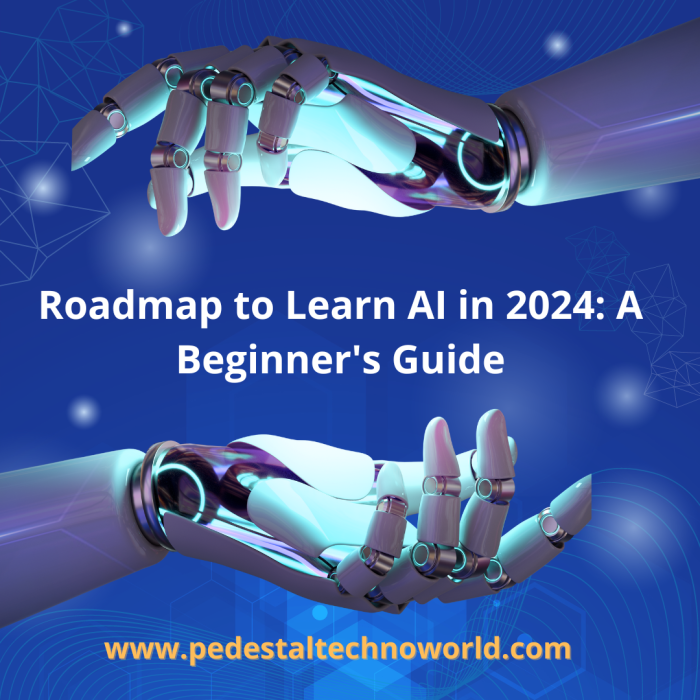Roadmap to Learn AI in 2024: A Beginner's Guide

Posted by HQ Pedestal Posted by Jul 22, 2024 in Artificial intelligence
Artificial Intelligence (AI) is no longer just a futuristic concept; it's a present-day reality that's transforming industries and creating countless opportunities. If you're eager to delve into this dynamic field, 2024 is an excellent time to start. This comprehensive guide will provide a clear roadmap for beginners to learn AI, from the foundational basics to advanced topics, ensuring a structured and effective learning journey. Let’s get started!
1. Understanding the Basics
What is AI?
Artificial Intelligence (AI) refers to the simulation of human intelligence processes by machines, particularly computer systems. These processes include learning (acquiring information and rules for using it), reasoning (using the rules to reach approximate or definite conclusions), and self-correction. AI applications include expert systems, speech recognition, and machine vision.
Key Concepts
Machine Learning (ML): A subset of AI that involves the use of algorithms to parse data, learn from it, and make informed decisions. It’s like teaching machines to learn from experience.
Deep Learning: A more specialized subset of ML that uses neural networks with many layers (deep networks) to analyze and learn from vast amounts of data. Deep learning is the driving force behind many modern AI applications, such as image and speech recognition.
Why Learn AI?
AI is one of the most sought-after skills today, with applications across numerous industries including healthcare, finance, transportation, and entertainment. By mastering AI, you open doors to a plethora of high-demand job roles such as AI engineer, data scientist, machine learning engineer, and more. Not only does this field offer lucrative career opportunities, but it also empowers you to be at the forefront of technological innovation.
2. Learn Python
Python is the most popular programming language for AI due to its simplicity and a vast array of libraries.
Start with Basics: Learn the fundamentals of Python, such as variables, data types, loops, and functions.
Libraries to Know: Get familiar with important libraries like NumPy (for numerical data), Pandas (for data manipulation), and Matplotlib (for data visualization).
3. Study Mathematics for AI
AI heavily relies on mathematics, especially the following areas:
Linear Algebra: Understand vectors, matrices, and tensor operations.
Calculus: Learn about derivatives and integrals, which are essential for optimization algorithms in AI.
Probability and Statistics: Grasp the basics of probability, distributions, and statistical tests to handle data effectively.
4. Get Comfortable with Data
Data is the backbone of AI. Learn how to collect, clean, and preprocess data.
Data Collection: Understand how to gather data from various sources.
Data Cleaning: Learn techniques to handle missing values, outliers, and data inconsistencies.
Data Preprocessing: Master the methods to prepare data for AI models, such as normalization and encoding categorical variables.
5. Learn Machine Learning
Machine learning is a subset of AI focused on building systems that learn from data.
Supervised Learning: Start with algorithms like Linear Regression, Decision Trees, and Support Vector Machines.
Unsupervised Learning: Explore clustering algorithms like K-means and hierarchical clustering.
Reinforcement Learning: Get an introduction to algorithms that learn through rewards and penalties.
6. Explore Deep Learning
Deep learning, a subset of machine learning, deals with neural networks and is essential for tasks like image and speech recognition.
Neural Networks: Learn the basics of neural networks, including perceptrons and backpropagation.
Deep Learning Frameworks: Get hands-on experience with frameworks like TensorFlow and PyTorch.
7. Work on Projects
Practical experience is crucial to understanding AI concepts.
Beginner Projects: Start with simple projects like image classification, sentiment analysis, or chatbot development.
Advanced Projects: Move on to more complex projects such as natural language processing, computer vision, or AI in gaming.
8. Enroll in a Course
If you're in Jaipur, consider enrolling in the AI course offered by Pedestal Techno World for hands-on learning and mentorship. When selecting a course, consider your learning style and schedule. Online courses offer flexibility and a wide range of topics, while in-person courses can provide more personalized guidance and networking opportunities. The AI course in Jaipur by Pedestal Techno World is designed to offer hands-on learning experiences, making it an excellent choice for beginners.
Conclusion
Embarking on a journey to learn AI in 2024 is an exciting and rewarding endeavor. By following this roadmap, you'll build a strong foundation and be well on your way to becoming proficient in AI. Remember, the key is to stay curious, practice consistently, and never stop learning.
